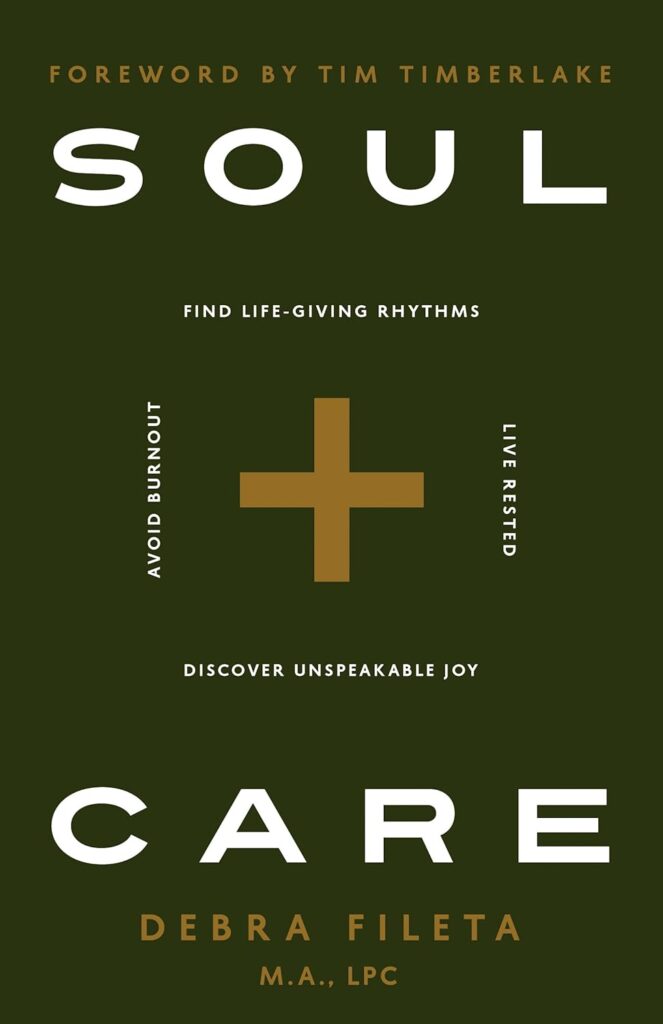
Soul Care: Find Life-Giving Rhythms | Live Restored | Avoid Burnout | Discover Unspeakable Joy
By Debra Fileta
(Harvest House 2024)
This isn’t a once-and-done answer, because different seasons of life bring different demands and influence our capacity. ... We also have to learn to be aware of our emotions as well as the signals our body is sending us and respond to those.
— Debra Fileta
How full do you feel?
As short as that five-word inquiry may be, the question can prove tricky to answer — especially, perhaps, for those who aren’t feeling all that full. That’s the question Debra Fileta wants you to consider. For those who can answer and those who can’t, her new book, Soul Care, sheds light on the abundant life.
Fileta, a professional counselor, spoke with Common Good about how to assess one’s fullness, the signs and symptoms of burnout, and what it looks like to follow the example of Jesus in caring for our souls.
You begin the book by asking readers “How full do you feel?” How can people begin to uncover their answer to that question?
Soul Care is ultimately about understanding and honoring our capacity. Whether or not we want to admit it, human beings do have a capacity. We’re limited in energy and ability. It’s important to assess how “full” we feel regularly. A simple way to do that is to look at a scale of 0 to 10 — 0 being I feel depleted of energy and strength with nothing left to give, and 10 being I feel filled to overflowing — and give ourselves a subjective number.
This isn’t a once-and-done answer, because different seasons of life bring different demands and influence our capacity. We have to learn to do a regular assessment of where we’re at and how we’re feeling. We also have to learn to be aware of our emotions as well as the signals our body is sending us and respond to those.
Signs of burnout include fatigue, apathy, anger and irritability, a lack of motivation, and even a lack of joy in the things we used to be excited about. Burnout can even begin to impact our body through the inability to concentrate, feeling tired all the time, difficulty sleeping, and unexplained aches and pains. If left for too long, it can lead to addictions and unhealthy behaviors because we try to “numb” rather than fill in healthy ways. If you’re seeing those in your life, it’s not time to push through — it’s time to stop and care for yourself.
“Whether we’re self-absorbed or self-neglecting,” you write, “we will end up becoming the center of our worlds.” How so?
We tend to avoid soul care because we’re afraid of being “selfish.” So we self-neglect. We pour out without ever filling back up. But the irony is that when we self-neglect, we end up depleted, drained, burned out, resentful, and bitter — and when you are in those empty places, because you feel so bad, the only person you can think of is yourself. By caring for ourselves and staying filled, we allow ourselves to do more for others; our level of effectiveness directly correlates to our level of fullness. When we’re filled — we can pour out effectively.
How does tending to our souls empower us to care well for others?
Self-care practices are one-time actions meant to alleviate stress, but soul-care rhythms are long-lasting rhythms that help us prevent burnout to begin with. My book Soul Care takes a look at the six rhythms that Jesus himself practiced to care for his soul and to stay filled and overflowing. How much more do we need to practice these healthy rhythms?
We were made to live abundantly. I believe that if Jesus said it and modeled it, then we can live it, too.
For those who feel entirely overwhelmed, how would you encourage them to take a first step toward caring for their souls?
First, start by assessing where you are “leaking” the most energy. If your life is like a tank, you want to plug up the holes where the water is draining, and then learn how to fill up as the next step.
I created a free quiz to help people identify which rhythm might be the weakest in their lives; that should be the rhythm we begin with. And it’s going to look different for each person. Once you find out which area is your struggle point, start by focusing on that rhythm.
Many of Common Good’s readers are ministry leaders, whether professionally or as volunteers. What would you like to tell them about the importance of caring for their souls?
Even Jesus — who was fully God yet fully man — understood and honored his human capacity. He took the time to rest, to set boundaries, to connect in life-giving relationships, to get away with God, to spend time in prayer. If Jesus honored his own needs so that he could do all that God had called him to do, how much more do leaders and caregivers need to do that?
If we want to be effective, we need to be filled. Because when our tank gets to empty, we find ourselves in unhealthy spaces. And if we go down, it impacts everyone around us.
This interview has been edited for clarity. Soul Care: Find Life-Giving Rhythms | Live Restored | Avoid Burnout | Discover Unspeakable Joy is available from Harvest House Publishers.





